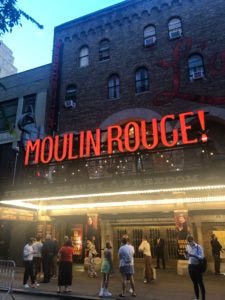'MOULIN ROUGE!' & 'STRANGE LOOP' TEST TONY TRADITION OF GOOSING GROSSES
Eight months after winning the Tony Award for best musical, Hamilton's weekly grosses were up 45 percent. Dear Evan Hansen's were higher by a comparable margin after its win.
Grosses for Moulin Rouge! at the Al Hirschfeld Theatre were down 25 percent last week compared with early fall, when the adaptation of Baz Luhrmann's 2001 movie reopened as Broadway's newly minted best musical. At $1.2 million, its box office is off by nearly half since the end of 2019, when Moulin Rouge! was the top grossing new production of 2019-20, with an average ticket price second only to Hamilton.

The best musical Tony, which will be awarded Sunday night at Radio City Music Hall, has traditionally put a show on a fast track to profitability. That hasn't happened with Moulin Rouge!, but it's still standing, which is itself an accomplishment during a pandemic. Among last year's runners-up for best musical, Jagged Little Pill closed in December 2021 and Tina is scheduled to depart in August.
The Moulin Rouge! Broadway production company, MRB Musical LLC, returned 70 percent of its $28 million capitalization to investors as of May 31, according to papers filed with the office of New York Attorney General Letitia James. It's had a lot of help: $15 million in performance disruption insurance proceeds and $10 million in federal relief from the Small Business Administration's Shuttered Venue Operators Grant program. That $25 million exceeded the $18 million the producers spent shuttering the musical in March 2020 and reopening it in September 2021.
Moulin Rouge! has been buffeted by the same headwinds -- multiple virus variants and below-peak tourism (notwithstanding the pedestrian traffic in Times Square) -- that prompted recent closing notices posted by Dear Evan Hansen and Come From Away. Both opened in 2016-17 and have enjoyed long, profitable runs.
It's possible that cancelled performances this past winter undermined sales today, because of customer concerns about future cancellations. "Our biggest booking time is January, February and March for performances in April, May and June," said Scott Mallalieu, president of the group sales agency GreatWhiteWay.com. "When there's not great news, people don't place orders as quickly."
Moulin Rouge!, which is set in fin-de-siècle Paris, is also a Tony winner with an asterisk. It opened in an abbreviated season with just four eligible new musicals, versus nine in 2021-22. What Ben Brantley called a "cloud-surfing, natural high of a production" in the New York Times, Sara Holdren described in New York magazine as a show that "feels like it was assembled by committee, even by algorithm." Show-Score, which aggregates theatergoer and critic reviews, gives Moulin Rouge! an 84, the lowest score among all best musical Tony winners still on the boards.
Cast members were hit hard by Covid, especially early in the pandemic. Danny Burstein, who went on to win a Tony for playing the ringmaster Harold Zidler and has since been replaced by Eric Anderson, wrote movingly in The Hollywood Reporter about his harrowing experience in the hospital fighting the virus.
Thursday night, I paid $129 at the box office for a seat in the 14th row, center orchestra. The audience seemed transported by the earnest and strong-singing leads: Derek Klena, who replaced Aaron Tveit, the winner of an uncontested Tony for the role of Christian; and Tasia Jungbauer, a going-places understudy who went on as the female lead Satine, the consumptive yet limber courtesan originated by Karen Olivo. (The role is normally played by Ashley Loren, a former Satine standby and alternate.)
While the musical catalog -- featuring Adele, Sia, Lady Gaga and Madonna -- now registers as more camp than hip, my favorite moments of the show were undiminished: Satine singing the Katy Perry hit "Firework" and the kinetic second-act opener combining Lady Gaga’s “Bad Romance” and the Eurythmics “Sweet Dreams (Are Made of This),” enhanced by strobe effects.
In contrast, Michael R. Jackson's A Strange Loop is more of a critics' darling than the Montmartre spectacle. With a relatively modest capitalization of about $9.5 million, Strange Loop represents a return to the norm, size-wise, for a favorite for best musical. It had sales of $686,000 last week and an average ticket price of $105, leaving ample room for growth.
How long Jackson's self-described "big, Black and queer-ass American Broadway show" can run is anyone's guess. It should help that the Tonys has returned to its traditional June ceremony, after the postponed and barely viewed outing last September that was intended to aid the industry's reopening.


